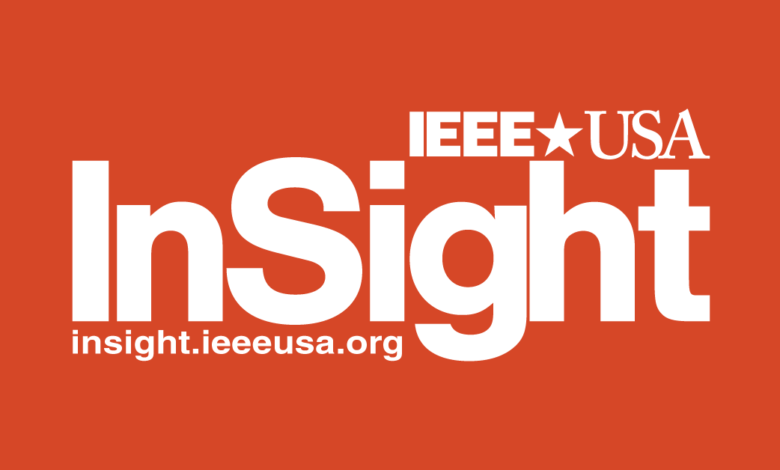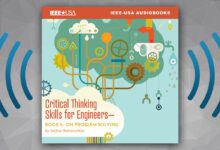
Leslie Martinich is constantly looking to catch the next wave of innovation: she’s worked for a variety of start-ups, started her own management consulting firm that guides companies in leading innovation, and spent the year of 2012 serving as the sole IEEE-USA Congressional Fellow in Washington, D.C.
In fact, Martinich began innovating at a young age, when she acted against the expected societal norms, and the advice teachers gave her NOT to pursue her passions. “When I was in high school, I really loved biology,” says Martinich. “I told my teacher that I’d like to be a scientist, but she told me that there was no need, because all the world’s problems had already been solved by scientists.” Another teacher, after giving Martinich’s science group a company tour, told the students that they could “have any job they wanted,” before quietly telling Leslie, the only female in the group, that she could be a librarian.
Martinich didn’t let these obstacles stop her. She’d always shown an aptitude for science and math, and she proceeded to pursue her dream, supported by teachers and role models who lent encouragement. Perhaps the biggest influence on Martinich was her father, who died suddenly of a heart attack when Leslie was just eleven years old. “My dad was a civil engineer, and he had taught me a lot about drafting and math,” she says. “As the oldest, I felt I had to get serious about a career and job, and so I focused on math.” Martinich, who claims she was born “serious” (but has since lightened up!) loved that, with algebra and geometry in particular, she could know whether she had solved a problem correctly. “I appreciated that you could use deductive reasoning to come to a conclusion, and that’s the way I began making decisions about what to do in my life,” she explains.
Ultimately deciding to become a computer scientist, Martinich began working in Austin, Texas, in the early 1980s at Execucom, before stints at IBM and Novell. “At Novell, we were building the networking industry, and I found it so much fun to work in an industry that was leading innovation and growing,” she explains. “I looked at it as “catching the wave of innovation.'” She loved catching such waves so much that, after Novell, Martinich worked for a series of start-up companies that she thought could be the next big thing, including companies focused on online purchasing and handheld devices–before either had been established. Then, in early 2001, she founded Competitive Focus, a consulting firm that helps companies be more successful in innovation. “We teach people how to manage organizations effectively, what the dynamics of innovation are, and how to make those dynamics work for your organization and area of innovation,” she says.
But, recently, Martinich took on a different type of consulting and advisory work. After speaking with Sherry Gillespie, a former IEEE-USA Congressional Fellow, Martinich felt encouraged to apply for the Fellowship and learned in early summer 2011 that she had been selected. By the time 2012 kicked off, she had moved to Washington, D.C., to work in the office of Representative Steve Israel of New York.
The IEEE-USA Congressional Fellows program began in 1973, with a mission to help spread scientific and technical knowledge in the U.S. government. Each year, there is at least one Congressional Fellow, and sometimes two, as well as another Fellow who serves within the U.S. Department of State. The applicant pool is narrowed down by a selection committee made up of six IEEE members, some of whom were former Fellows themselves. To be considered, applicants must meet one of three criteria: a Bachelor of Science degree, and at least ten years’ experience in engineering or qualified science; a Master’s degree, and at least five years’ experience; or a Ph.D., with no experience necessary. Candidates are then evaluated on “whether they have the social and diplomatic skills, as well as the technical skills, to successfully work with their sponsoring office to ensure sound policymaking,” says Erica Wissolik, Program Manager, Government Relations for IEEE-USA.
According to Wissolik, “we get a lot of inquiries about the program, but not everyone can take a year out of their lives and move to D.C.” In particular, Wissolik would like to see participation by women increase, noting that “in the last few years, we have seen at least one woman apply, but there have been years when no women do.” With the program having changed in 2013 to run on the school year and not the calendar year, the team believes more IEEE members will be able to accommodate the time away.
For those who participate, the experience can be life-changing. “A State Department Fellow left midway through the program one year, because a brand new government office was created and snatched him up,” says Wissolik. “During Sherry Gillespie’s Fellowship year, she worked on a bill related to cybersecurity, and was then hired by the agency who implemented the legislation.” Martinich says the experience has definitely affected what she wants to do, once back in Texas. “I’m seeing the world from a much broader perspective and I know this will influence what I do,” she describes. “Austin has some programs that are very forward-thinking, especially in the energy industry, so I’m considering how I can contribute.”
Part of what has broadened Martinich’s perspective is her portfolio of work, an opportunity she has because of the office she chose. “After a two-week immersion program, where we learn about working in Congress and how policy is made, we do a meet-and-greet with a variety of Senate and House personal and committee offices,” she explains, referring to herself and the thirty-four other Congressional Fellows. “I was hoping to find an office that focused on innovation.” Observing that Senate committee offices tend to focus deeply on one aspect of science or engineering, whereas House personal offices deal with a wider variety of issues and have smaller staffs, she opted for House Representative Israel’s personal office. “My portfolio includes a breadth of things, such as NASA, the Environmental Protection Agency, clean tech issues, small business, and also the Judiciary,” says Martinich. “The inclusion of the Judiciary surprised me at first but, in Congress, science, commerce, and the Judiciary are all lumped together.”
One of her favorite parts has been recognizing the interdependent relationship between science and public policy, citing the area of stem cell work as an example. “Science figured out that you could use stem cells for a lot of things in human health and that affected policy, because a law was created to prevent the harvesting of stem cells from aborted fetuses. That limitation on access circled back to have an effect on science,” she explains.
Martinich has also found herself working closely on an issue she never thought of before: energy jobs for veterans. As utility companies face an aging workforce, they have growing needs for skilled craft workers, but, says Martinich, “fewer people are majoring in power engineering, so there are not enough people in the pipeline to fill the need.” At the same time, there are a large number of military veterans returning to the United States, with the skills and experience needed, who are also seeking work. “It struck our office that this is a huge opportunity to make a match,” she says. “We’re giving the issue more visibility now and helping tackle the details of resourcing and credentialing. This is just something I never would have considered before, and I find it interesting to help solve these problems for the country.”
Though her professional focus now takes new turns, Martinich remains steadfast in her commitment to the next generation of female engineers and scientists. “I’m always taking on new groups of young girls to help them be successful,” she says. “I send them articles and keep them apprised of what the future holds, so they have awareness of what the next big wave of innovation could be.” Her own view is that the next wave will center on “big data,” which she believes will help scientists approach problems differently. In both innovation and career pursuits, Martinich advises aspiring STEM professionals to “keep on pushing” (the title of an article she wrote for the March 2012 IEEE-USA Today’s Engineer). “By that I mean “don’t give up,'” she says. “Do all the things you need to do to learn about the industry and get to know people. I didn’t give up when I was told the world already had enough scientists. Just keep on trying and keep on pushing.”
Leslie Prives is a freelance writer living in New Your City.






